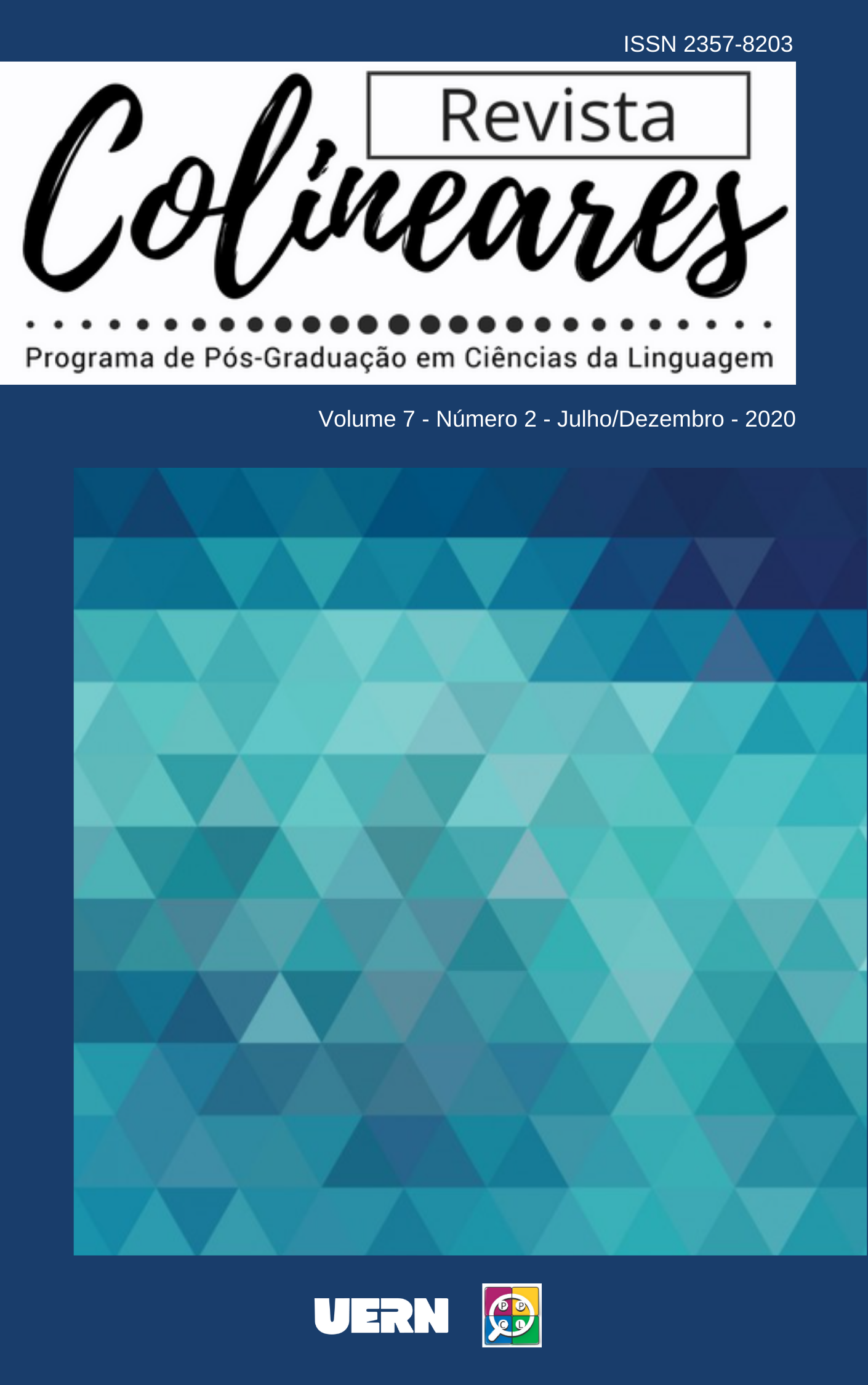Who is Marielle Franco? An image investigation proposal constructed by media discourse
Keywords:
Identity, Collective imaginaries, Decolonial, Black feminismAbstract
The present study aims to investigate the images attributed to Councilwoman Marielle Franco, who was murdered with her driver Anderson Gomes. Such a loss meant a throwback for women"™s movements. The research is based on Semiolinguistic Discourse Analysis, proposed by Patrick Charaudeau, and on Black Feminism, from the perspective of decolonial feminism. The Semiolinguistic Theory offers theoretical support for the understanding of the discursive processes, resulting from the position of the discursive subjects, according to their project of influence. In this perspective, it is intended to apprehend images of the councilwoman, and also the collective imagery constructed around these identities. The intersectionality, which is in the presentation of Marielle Franco as a woman, black, lesbian, mother and defender of human rights, reveals the awareness of the proposals of Black Feminism that advocates the fight to combat inequality. The analysis of two articles, published by the sites G1 and BBC Brasil, reveals different identities of the councilwoman, engendered in quite different discursive construction strategies and collective imaginaries.
Downloads
References
BBC BRASIL. Em posts e projetos de lei: pelo que lutava Marielle Franco, vereadora assassinada no Rio [2018]. Disponível em: < https://www.bbc.com/portuguese/brasil-43398816> Acesso em:19 mar. 2019.
CHARAUDEAU, P. Para uma nova análise do discurso. In: CARNEIRO, A. O discurso da mídia. Rio de Janeiro: Oficina do Autor. 1996.
CHARAUDEAU, P. Uma análise semiolinguística do discurso. In: PAULIUKONIS, M.A.L; GAVAZZI, S. (Org.) Da língua ao discurso: reflexões para o ensino. Rio de Janeiro: Lucerna, 2005.
CHARAUDEAU, P. Discurso das mídias. São Paulo: Contexto, 2006.
CHARAUDEAU, P. Discurso político. São Paulo: Contexto, 2008.
CHARAUDEAU, P. Identidade linguística, identidade cultural: uma relação paradoxal. In: LARA, G. P., LIMBERTI, R. P. (Orgs.). Discurso e (des)igualdade social. São Paulo: Contexto, 2015.
DAVIS, A. Mulheres, Cultura e Política. São Paulo: Boitempo, 2017.
FRANCO, M. Mulher, preta, favelada e parlamentar: resistir é pleonasmo. In: RUBIM, L.; ARGOLO, F. (Org.). O Golpe na perspectiva de Gênero. Salvador: EDUFBA, 2018, 186 p.
G1. Políticos, governos, partidos e entidades lamentam morte de Marielle Franco. [2018]. Disponível em: < https://g1.globo.com/rj/rio-de-janeiro/noticia/parlamentares-lamentam-morte-de-marielle-franco.ghtml> Acesso em: 19 mar. 2019.
LORDE, A. Irmã outsider: ensaios e conferências. Belo Horizonte: Autêntica, 2019.
LUGONES, M. Rumo a um feminismo descolonial. Estudos Feministas, Florianópolis, v. 3, n. 22, p. 935-952, out. 2014.
OLIVEIRA, I. O contrato de comunicação da literatura infantil e juvenil. Rio de Janeiro: Ed. Lucerna, 2013.
QUIJANO, A. Colonialidade do poder e classificação social. In: BOAVENTURA, S. S; MENESES, M. P. (Orgs.). Epistemologias do sul. Coimbra: Edições Almedina. SA, 2009.
RIBEIRO, D. Quem tem medo do feminismo negro? São Paulo: Companhia das Letras, 2018.
RIBEIRO, D. Pequeno manual antirracista. São Paulo: Companhia das Letras, 2019.
ROCHA, L. M. A vida e as lutas de Marielle Franco. Em Pauta: teoria social e realidade contemporânea. v. 16, n. 42, p. 274-280, 2018.
SANTOS, V. M. dos. Notas desobedientes: decolonialidade e a contribuição para a crítica feminista à ciência. Psicologia e Sociedade. v. 30, e 200112, p. 1-11, 2018.
VELASCO, M. J. Introducción. Construyendo puentes: en diálogo desde / con el feminismo negro. In: JABARDO, M. (Org.). Feminismos negros: una antología. Madrid: Traficantes de Sueños, 2012, p. 27-56, 2012, 321p.
Downloads
Published
How to Cite
Issue
Section
License
Copyright (c) 2020 Verônica Palmira Salme de Aragão, Camila Kayssa Targino Dutra

This work is licensed under a Creative Commons Attribution-NonCommercial-ShareAlike 4.0 International License.






